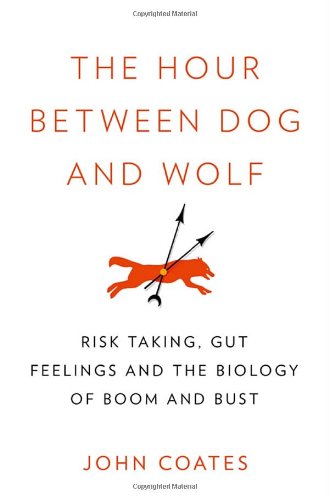One of the most difficult things to do as investor is to go against the prevailing sentiment for both securities and the overall financial markets. Efficient markets theory, common sense and now even “Big Data” dictate that you can’t be right and everyone else wrong – but that’s very often the case.
It’s very lonely maintaining an investment in an out-favour issuer or having a fully invested portfolio in a declining market when the market consensus turns negative. The financial media and professional investment commentators like nothing better than to kick someone or something when they’re down. The financial media is drawn to negative scenarios like moths to the flame, so there’s lots of evidence that you’re wrong, despite your analysis and valuation.
Thankfully, John Coates, a former derivatives trader with PhDs in both economics and neuroscience, has delved deep into the psychology and physiology of traders and markets. He confirms the core value investor belief that markets aren’t impartial assessors of price and value. Coates establishes that the markets are affected by the biochemistry of individual humans on an aggregated level. He doesn’t rely on supposition; his research actually used blood tests to focus on the physiology of traders in various market conditions.
What Coates found was that the high levels of testosterone pulsing through the largely male trading community reinforce soaring markets and prices. Traders become literally drunk with their own success and are biochemically stimulated into both personally and professionally risky behaviours. Testosterone drives the trader and investment banker to celebrate a successful deal with incredibly expensive bottles of wine, an act that is later seen as banker excess. It also encourages a feeling of invulnerability that causes the assumption of outsized and risky positions.
Down markets are the opposite. Failure and losses threaten livelihoods and create high levels of cortisol that amplify risk avoidance behaviors. The cowed traders are literally frozen in indecision or irrationally terrified. They are physically unable to continue trading and liquidate their positions to end their market pain.
Success in the investment markets means a great deal of discipline and stoicism. As Coates says in his book, the aggregated behavior of individual traders causes extremes of euphoria and depression that puts the financial markets in a “clinical state.” Economist John Maynard Keynes called this “animal spirits” and noted that courage was essential to successful investment.
Coates’ book is a valuable part of any investor’s education and provides solace to those who eschew closet indexing and “low cost” ETF strategies.
It’s hard to go against the grain, but Coates provides hard evidence that shows it’s also necessary.


